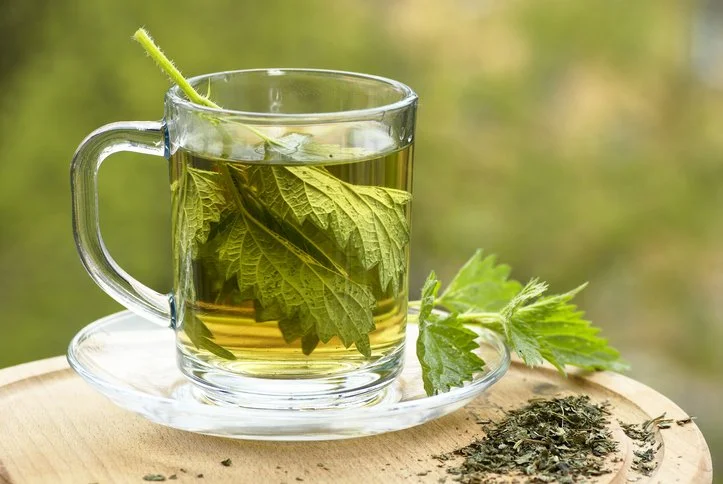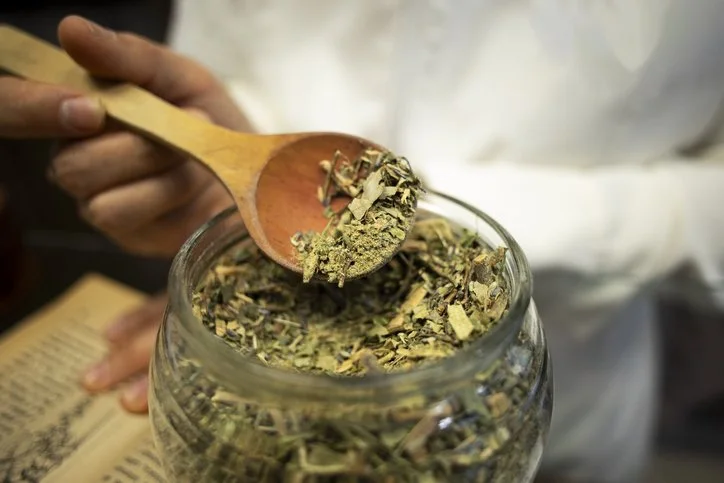Nettle Leaf Tea is stinging with health benefits
By: Joy Stephenson-Laws, Holistic Coach, J.D., Founder
I’m a big fan of drinking tea. My kitchen cupboard is stocked with all types of tea: peppermint and ginger (to promote digestion after meals or ease an upset stomach ), matcha (for a jitter-free, morning pick-me-up and antioxidant punch), chamomile (for rest and relaxation before bed). This is just to name a few. Honestly, I could probably start a small tea shop with all the different kinds of tea I have. I like to think of my tea collection as part of my homeopathic medicine cabinet.
“Tea trees originated in southwest China 60 million or 70 million years ago. Written records show that Chinese ancestors had begun drinking tea over 3000 years ago,” according to an article published in BMC Medicine.
“Nowadays, with the aging of populations worldwide and more people suffering from non-communicable diseases or poor health, tea beverages have become an inexpensive and fine complementary and alternative medicine (CAM) therapy.”
Tea is the second most consumed beverage after water and is consumed by more than two-thirds of the world’s population.
Some of the potential health benefits of tea include:
A lower cancer risk
Better weight management
Improved immune function
Less stress and inflammation
Better hormone health
Improved heart health
Recently, I was organizing my tea collection. When I do this, I can’t help but see if there are any new teas I want to add even if I “don’t really need them.” After doing a little research I discovered that there is a tea that I most definitely want to add to the mix — nettle leaf tea.
what is nettle leaf tea?
Nettle leaf tea is made by steeping the dried or fresh leaves of the stinging nettle plant in hot water. Stinging nettle (Urtica dioica) is a perennial flowering plant found across Europe, Asia, North America, and parts of Africa. It is known for the tiny, hair-like structures on its leaves and stems that release histamines and other irritants when touched—causing a stinging or burning sensation.
Despite this, it's been highly valued for centuries due to its rich nutritional and medicinal properties. Once heated, the stinging properties are neutralized, making it safe and soothing to drink. The tea is known for its earthy, slightly grassy taste and is commonly used in herbal medicine.
The young leaves of the stinging nettle plant can also be used to make curries, herb soups, and sour soups.
For centuries, cultures across Europe, Asia, and North America have brewed nettle leaves into teas and tonics for everything from seasonal allergies to joint pain. Today, modern science is beginning to back up what traditional healers have long known: nettle is packed with nutrients and therapeutic potential.
“Stinging nettle has antiproliferative, anti-inflammatory, antioxidant, analgesic, anti-infectious, hypotensive, and antiulcer characteristics, as well as the ability to prevent cardiovascular disease, in all parts of the plant (leaves, stems, roots, and seeds),” (Nutritional and pharmacological importance of stinging nettle (Urtica dioica L.): A review, Heliyon).
What particularly caught my eye about nettle leaf tea is that it contains a variety of vitamins and minerals.
Some of the nutrients nettle leaf contains include:
That’s quite a powerful punch of nutrients in a tea!
Nettle Leaf tea may provide specific health benefits for women
Due to its astringent properties, nettle leaf tea may help with premenstrual symptoms and reduce blood flow during menstruation. Furthermore, it may even help ease symptoms that women may experience during hormonal shifts in menopause. This tea may even improve breast milk production (but consultant your doctor or a competent healthcare professional).
Nettle Leaf Tea May Support Seasonal Allergy Relief
One of nettle’s best-known uses is as a natural antihistamine. Nettle leaf may help block histamine receptors and suppress inflammation in allergic responses. People who suffer from hay fever (allergic rhinitis) often turn to nettle tea as a gentle, plant-based way to reduce sneezing, runny nose, and congestion—without the drowsiness of over-the-counter meds.
Nettle Leaf Tea May Support urinary tract health
Nettle leaf acts as a mild diuretic, helping the body flush out excess fluids and potentially preventing urinary tract infections (UTIs). It may also support prostate health in men—some studies suggest that nettle root (a related part of the plant) helps with symptoms of benign prostatic hyperplasia (BPH), and the tea may offer milder support.
Nettle Leaf Tea May AID in BLOOD SUGAR REGULATION
Preliminary research suggests that nettle may help lower blood sugar levels. Its effects on glucose metabolism are still being studied, but some animal and human trials have shown promising results for people with type 2 diabetes or insulin resistance.
Nettle Leaf Tea May support and detox the liver
Thanks to its diuretic and antioxidant effects, nettle leaf tea may support gentle detoxification. It helps promote kidney and liver health by increasing the elimination of waste through urine, while its antioxidant compounds support the body’s natural cleansing systems.
real-life account of a nettle tea lover: “I drank nettle tea every day for a month, and the results truly surprised me”
In an article from Glamour Magazine, one woman shared her experience with drinking nettle leaf tea for a month. She discovered the tea on TikTok, and decided to give it a go. As someone with Hashimoto's disease, an autoimmune condition, she was particularly interested to see how the tea would affect her.
“For me, I wanted to see if drinking nettle tea would help me build a healthy metabolism: less water retention, fewer headaches, less fatigue. These are all symptoms of a slow metabolism, which I struggle with, particularly due to my thyroid condition.”
Because it is a calming and caffeine-free tea, she decided to have two cups in the evening. After about a week, she noticed that her face was less puffy. By the end of the second week, she had noticed she had gone two weeks without experiencing a migraine.
“During week three, I noticed that other parts of my body were also less tense, and I felt less bloated. I’ve also been told several times that ‘my skin is so radiant.’ It’s a compliment that – as a lazy person in the skincare department – I have rarely received in the past.”
She also said that drinking this tea motivated her to workout more, eat less salt and go to bed earlier. That’s the beauty of healthy habits such as drinking herbal tea — it tends to have a snowball effect. On the contrary, bad habits and a poor lifestyle seem to snowball as well. This is why it is so important to lead a healthy lifestyle and be proactive about your health.
Precautions to Keep in Mind
Nettle tea is generally safe for most people, but it’s still a potent herb. Some things to note:
Pregnant women should avoid it unless cleared by a healthcare provider—it may stimulate uterine contractions.
If you’re taking blood thinners, diuretics, or medication for blood sugar, check with your doctor first.
Start with small amounts to make sure you don’t have a sensitivity or allergic reaction.
Final Thoughts
Nettle leaf tea is a powerhouse of plant-based health benefits—from soothing inflammation to boosting nutrients and gently supporting detox. Whether you're sipping it for seasonal allergies or as part of your wellness ritual, it’s a simple and time-tested way to tap into herbal healing.
As always, let your healthcare provider know about any new herbal remedies you’re adding to your routine, especially if you’re managing chronic health conditions.
Try a cup today—and discover why this humble “weed” has been cherished for centuries.
REFERENCES
Bhusal, K. K., Magar, S. K., Thapa, R., Lamsal, A., Bhandari, S., Maharjan, R., Shrestha, S., & Shrestha, J. (2022). Nutritional and pharmacological importance of stinging nettle (Urtica dioica L.): A review. Heliyon, 8(6), e09717. https://doi.org/10.1016/j.heliyon.2022.e09717
Dou, Q. P. (2019). Tea in health and disease. Nutrients, 11(4), 929. https://doi.org/10.3390/nu11040929
Glamour Magazine. (2024, November). I drank nettle tea every day for a month, and the results truly surprised me. https://www.glamourmagazine.co.uk/article/nettle-tea-self-test
Pan, S. Y., Nie, Q., Tai, H. C., Song, X. L., Tong, Y. F., Zhang, L. J. F., Wu, X. W., Lin, Z. H., Zhang, Y. Y., Ye, D. Y., Zhang, Y., Wang, X. Y., Zhu, P. L., Chu, Z. S., Yu, Z. L., & Liang, C. (2022). Tea and tea drinking: China's outstanding contributions to the mankind. Chinese Medicine, 17, 27. https://doi.org/10.1186/s13020-022-00571-1






